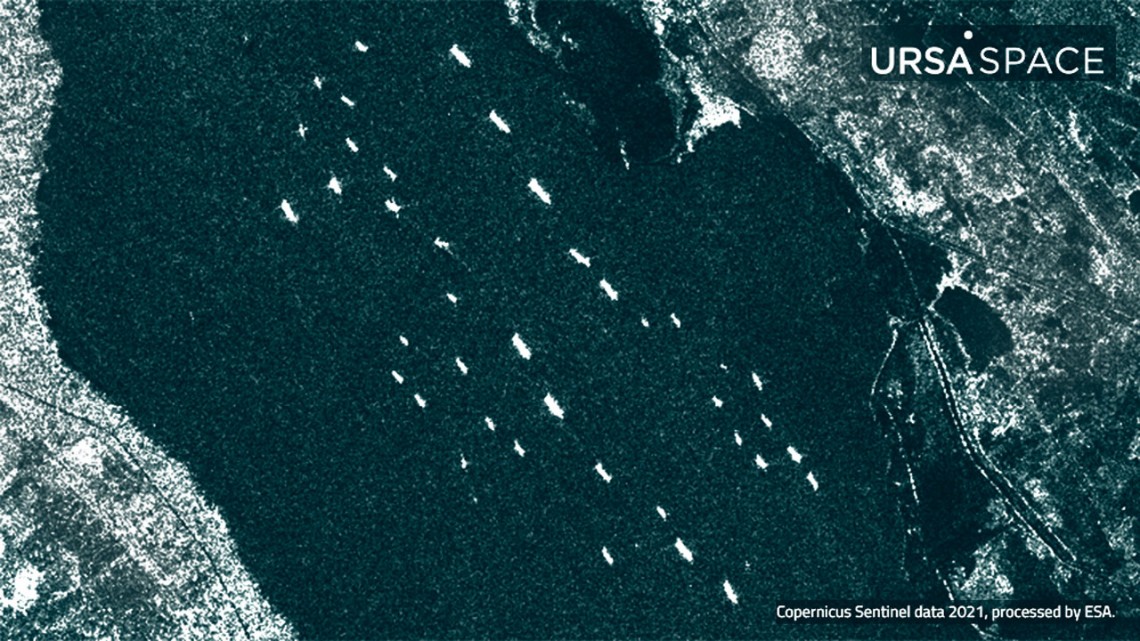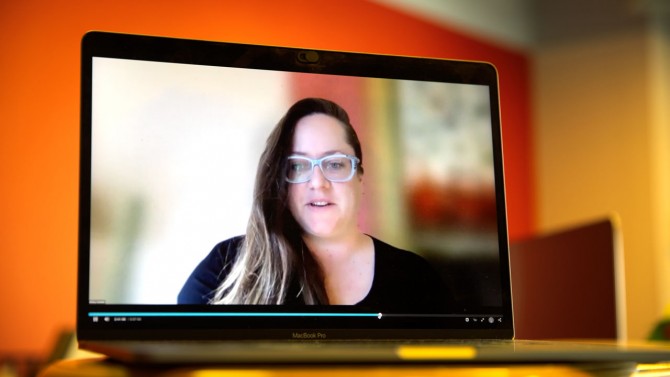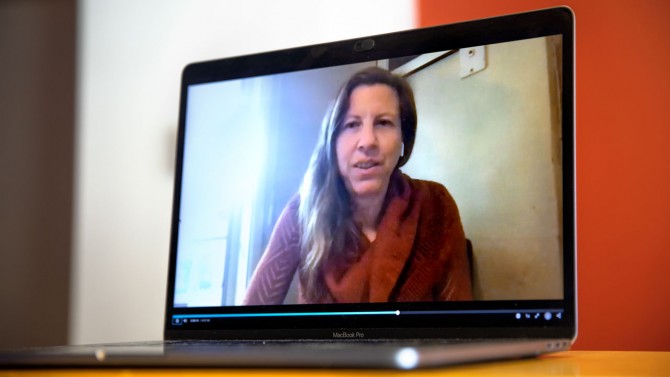
Dozens of oil tankers and commercial cargo ships line up at Great Bitter Lake to enter the Suez Canal in this March 25 satellite image provided by Ursa Space.
Cosmos unveils space-tech business, science opportunities
By Blaine Friedlander
With several forthcoming space missions, the acceleration of the satellite industry and more STEM opportunities for women and people of diverse cultures, the business prospects and scientific visions of the cosmos are just beginning to take off.
More than a dozen space industry leaders, capital investors, startup entrepreneurs, a Jet Propulsions Lab manager and Cornell professors gathered virtually for Cornell’s first Space Tech Industry Day/K.K. Wang Day symposium on April 23 – featuring this year’s event theme, “New Opportunities in Space Technology.”
Adam Maher ’06, M.Eng. ’07, co-founder and CEO of Ursa Space Systems, a startup company in Ithaca that provides satellite imagery, said the satellite business environment is heating up.
“In 2018, there were more satellites being built in that single year than in the previous two decades. It’s accelerating,” Maher said, noting that building and launch costs have dropped substantially, making it easier for companies like his to provide value.
Ursa Space is exploring new radar technology so that satellites – taking images of the Earth – may strip away cloud cover, day or night, to collect real-time data such as clogged ship traffic on the Suez Canal or to help teams gather visual information to help business on the ground, he said.
Britney E. Schmidt, associate professor at Georgia Tech, will be joining the Cornell faculty for the upcoming academic year, with a dual appointment as an associate professor of Earth and Atmospheric Sciences in the College of Engineering, and in the Department of Astronomy in the College of Arts and Sciences.
“Our research is using Earth as a window into how planets work and how to explore them,” Schmidt said, describing how her Antarctic research on the Ross ice shelf can prepare for a possible mission to Europa – an icy, oceanic moon of Jupiter.
“Our own planet can teach us new things about the Earth, but also teach us about other places and planets and how we might explore them,” she said. When working with the thick ice of the Antarctic, “you get pressures and temperature regimes that are very similar to the environments that we’ll likely find on Europa.”
Elaine Petro, assistant professor in the Sibley School of Mechanical and Aerospace Engineering, spoke about the important role that propulsion systems are playing in satellite internet constellations and the need for miniaturizing propulsion technology for the small satellite market. Petro also directs the Advanced Space Transit and Architectures Lab, or ASTRA Lab, where the team evaluates new kinds of propulsion systems for sustainable exploration of the solar system.
Cornell engineers and astronomers participate in the majority of NASA’s solar current and upcoming system exploration and astrophysics missions, including the Mars2020 Perseverance Rover, Insight, Europa Clipper and the James Webb Space Telescope, according to Alex Hayes ’03, M.Eng. ’04, associate professor of astronomy in A&S, speaking at the conference.
What makes Cornell unique, Hayes said, is that the university also supports its faculty and scientists to lead missions as principal investigators, such as the Mars Exploration Rovers led by Steve Squyres, professor emeritus in astronomy.
The upcoming Comet Astrobiology Exploration and Sample Return (CAESAR) led by Hayes; and Enceladus Life Finder, led by Jonathan Lunine, the David C. Duncan Professor in Physical Sciences and chair in astronomy (A&S), are concepts that will be proposed to the NASA’s upcoming New Frontiers 5 competition.
Jordana Blacksberg, investigation scientist for the Europa Clipper magnetometer from NASA’s Jet Propulsion Laboratory, serves as manager of the agency’s Strategic University Research Partnership program. Cornell is one of 14 official major university partners with JPL.
Giving advice to the undergraduate and graduates students attending the symposium, Blacksberg said, “Get as much project research and intern co-op work while you’re at Cornell as possible – that will give you experience and network and a foothold into the industry you're aiming for.”
Lynden Archer, the Joseph Silbert Dean of Engineering, and Ray Jayawardhana, the Harold Tanner Dean of Arts and Sciences, offered welcoming remarks at the symposium. David Erickson, the S.C. Thomas Sze Director of the Sibley School of Mechanical and Aerospace Engineering, served as the day’s host.
In the welcoming remarks, Archer announced that entrepreneur Steve Fujikawa ’77 has committed an eight-figure gift to aerospace engineering at Cornell, and said it is an investment that will strengthen the university’s status as a leader in space education and research.
The Stephen J. Fujikawa ’77 Endowment for Astronautical Engineering will be used for future investments in graduate fellowships, professorships and laboratory enhancements, with the ultimate goal of creating an institute for space technology, innovation and entrepreneurship.
Josh Wolfe ’99, managing director at Lux Capital, spoke on venture capitalism for space; keynotes were given by Jeff Guido ’07, director of special projects at Planet, and Cheryl Reed, program director of science and robotic exploration for tactical space systems at Northrop Grumman Space Systems.
Hayes and Mason Peck, the Stephen J. Fujikawa ’77 Professor of Astronautical Engineering, spoke about Cornell’s contributions to space development and technology.
Other speakers included: Bonnie Meinke, advanced systems manager, Ball Aerospace; Dmitry Savransky, assistant professor, Sibley School of Mechanical and Aerospace Engineering; and Barry Safier, technical director of Moog Space Systems.
Funding for the program was provided by K.K. Wang, professor emeritus, Sibley School of Mechanical and Aerospace Engineering.
Media Contact
Get Cornell news delivered right to your inbox.
Subscribe


